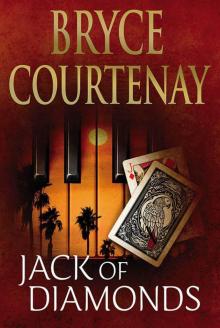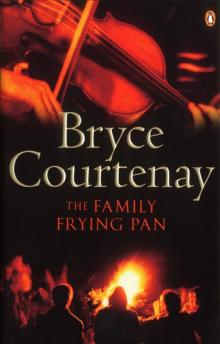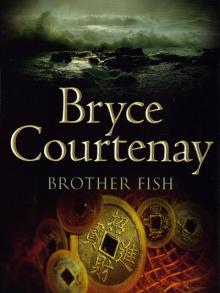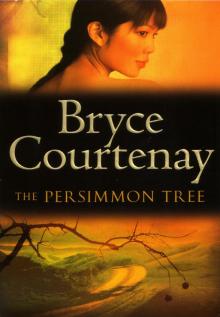- Home
- Bryce Courtenay
Sylvia Page 12
Sylvia Read online
Page 12
‘Shush, Israel! Be silent!’ his wife remonstrated. ‘Can’t you let a person hear!’ She laid aside her needlework and looked at us, placing her hands in her lap, and in a calmer voice instructed, ‘Pray continue, but from the beginning, I must hear this voice in one piece.’
I became aware that a crowd now filled the doorway to the little tailor’s shop and stretched along the narrow alleyway, folk pushing and jumping to their toes to catch a glimpse but silently, so they might more clearly hear us. I would later learn that we were in the Jewish Quarter and the crowd were mostly, if not all of them, Jews. When we had completed the song I turned to smile at the people gathered in the lane. This they repaid by clapping and shouting their approval, demanding more such gratuitous entertainment.
Throughout the song Israel had wrung his hands despairingly, frequently glancing at the crowd gathered outside the doorway to the shop and then back at his wife. It was plain to see he was afraid the street throng might enter the tailor shop, but he was even more afeard of his wife’s wrath if he should cause us to cease once more. The moment we had completed the song he rushed to pull down the metal shutters. When the crowd saw his intention they commenced to whistle and shout abuse and some rushed forward to batter at the metal bars, cursing him in a strange argot, which I was later to learn was Yiddish.
‘We don’t want trouble,’ Israel said, looking despairingly at his wife, then back at us. ‘Why are you here? What do you want?’ He pointed at the shutters. ‘Now you bring thieves and robbers to my door!’
‘Attire, sire.’ Reinhardt pointed at me, indicating my metal merchant’s sheepskin coat, somewhat soiled, and my gown from the widow Johanna, far from new, too large and fit only to be worn by a peasant and dirty also. Once again he indicated his own clothes. ‘We have only these, they are not suitable for our new endeavour.’
Israel shrugged and with a sweep of his hand indicated the racks of hanging clothes. ‘So, if you have money you can get.’
Reinhardt the Ratcatcher grinned and looked first down at his feet then slowly up at the Jew. ‘Ah . . . that is the . . . er . . . problem, sire.’
‘Then go, be off, already you have made enough trouble!’
‘But your cousin, Solomon . . . the rats?’ Reinhardt suggested again. ‘I am prepared to do one last rat ridding.’
‘Tush! Go see him. Let him pay you for his own rats. Then when you come back with the money we can do maybe some business.’
I confess I didn’t understand what Reinhardt was conspiring to do. This suggestion by the Jew seemed to me the most likely manner in which to conduct ourselves.
A hurtful look appeared on the ratcatcher’s face. ‘This is not about money, sire. You may with my permission negotiate any sum you wish with your cousin Solomon for my services and then keep it for thyself.’
Israel the Jew appeared only to hear the first part when a look of incredulity appeared upon his face. ‘Not about money? Let me tell you something for nothing, ratcatcher! Everything in the world is about money! There is only one certainty in life and it is common to both the prince and the peasant, the rich man and the pauper – neither the one nor the other will ever think they possess sufficient money.’
‘Shush, Issy!’ Sarah the Jewess cried out. ‘Do you not hear what the boy is saying?’
Israel turned to look at his wife. ‘Of course. It is about geld!’
‘Of course not!’ she retorted impatiently. ‘He wants to make a gesture of mutual trust. He wants we should trust him. He makes us an offer, Solly’s rat riddance, a reward for our trust.’
The little Jew looked incredulous. ‘Trust? A Gentile offers a Jew a reward?’
‘He wants us to go into the entertainment business.’
Israel, alarmed and astonished, looked at his wife. ‘What for?’
I could see Sarah’s patience with her husband was wearing to a final thread. ‘Because we would be most suitable partners,’ she explained, as if to a child. She looked at Reinhardt so that we should take good note of what she was saying to her husband as they were meant as sidelong words to us. ‘They are good, very good, but who do they know? Let me tell you . . . nobody! They know nobody! We shall dress them and introduce them. In this place you have to know already people.’ Playing to our attention she opened her left hand and with the forefinger of the right she touched each finger in turn as she spoke. ‘We know and dress noblemen, their ladies, knights, fair maidens, judges,’ then exhausting her left hand she flicked the fingers of her right to add, ‘ . . . guild merchants, mayors, important town officials, those who are rich and those who want to impress. They must needs be entertained and desire only the best musicians.’ She turned and pointed to Reinhardt. ‘The boy is no fool and, with my help, has a sound proposition.’ Then turning back to the little Jew, ‘Believe me, it fits like a glove. For the proper introductions and suitable attire, a percentage, what else?’ She looked at Reinhardt for confirmation and he nodded his agreement. The Jewess, now playing once more to her husband, cocked her head to one side and with her forefinger lightly touching her lip appeared to be thinking, then as if tasting the words she said aloud, ‘“Israel of Bonn – Entertainments to the Aristocracy!” Hmm, it has a most pleasing sound. What think you, liebling?’
Israel sighed and looked wearily up at his wife. ‘You ask me what I think? Of musicians let me tell you already. They are dirty, lazy, they smell, they eat all the food, they get drunk, fight, curse, fornicate and steal!’ He spread his hands and shrugged. ‘Otherwise, I have no problems with them!’
‘Good! Thank you, mein husband,’ she said, bowing her head slightly. ‘They are no different to the nobility, we will make a nice business.’ She turned to us, suddenly stern-faced. In a voice both businesslike and crisp, she commanded, ‘Come, we talk.’ She pointed to a doorway at the back of the shop, then suddenly turned back again to face us. ‘Always you will call me Frau Sarah and you will deal only with me.’ She looked directly at me. ‘You will curtsy when you come into my presence,’ she instructed. Then turning to Reinhardt, she added, ‘And you will bow and remove your hat when you wish to speak to me. Now, what be your names?’
CHAPTER FOUR
The Petticoat Angel
FRAU SARAH TOOK FROM a hook one of the oil lamps that lit the shop and we crossed the room to reach the door at the far end where she bade Reinhardt tarry awhile and bade me enter. The room was the width of the outer one, though smaller in depth, with the earthen floor covered in strewing herbs. My nose was assailed with the fresh scent of both rosemary and sweet fennel, a most pleasant combination that reminded me of the woods. All about the walls were shelves from the floor to the ceiling that contained bolts of cloth of every colour and description, velvets and silks, cotton and wool, enough it seemed to make a thousand rich garments.
Frau Sarah, having learned our names on the way across the room, placed the lamp to hang on a hook from the centre of the ceiling and now inquired, ‘Are you a virgin, Sylvia?’
‘Aye, Frau Sarah, I am chaste and pious, a Christian child of Jesus Christ the Saviour,’ I said with defiance. I had decided I would not kowtow to this Jewess and, as well, to take the widow Johanna’s advice and not count my virginity stolen by my father’s abuse (may he rot in hell). In my heart and soul I remained a virgin and felt sure that in this one thing I could with clear conscience create a lie, for God was well acquainted with my sins. I also told myself that if we were to work with this Jewess, then she must needs know that I was all the while a good girl and a devout child of Jesus.
‘Child? You call yourself a child? How old are you, Sylvia?’ she asked.
‘We are all children of God,’ I said sanctimoniously, then added, ‘Eleven or perhaps twelve, I am not sure of the season I was born.’
‘Well, do you bleed monthly?’
‘Nay.’ Ever since the widow Johanna had told me about the manner of the coming of my womanhood I had expected daily to find myself in a state of bleeding. Each morning in the fou
r days that had elapsed I expected to wake transformed, no longer a child but somehow loftier of demeanour. The need for the strips of cloth she had torn from my old Frau Anna gown was more than just for blood of childhood past. It was a badge, though invisible, of the arrival of my maturity. Alas, while it had been a long time since I had felt myself a child, I still remained a child within my body.
‘Can you feel your breasts tight and uncomfortable with swelling?’
‘Aye,’ I replied, ‘for some time now.’
‘It will come soon,’ she assured me. ‘If my brother, Herr Hermann, should ask, then you will tell him you are twelve years old . . . no, thirteen and already a woman. Do you understand me?’
‘Yes, Frau Sarah . . . but . . . but I am not to be soldas a slave. I . . . I will not allow it,’ I stammered.
Frau Sarah laughed and there was a pleasantness to the sound. ‘No, that was my mistake. That was before I heard you sing. You are to be an entertainer now.’
‘And a free woman?’ I ventured.
‘Do you answer to a nobleman from whence you came? Are you a serf? If so, then you must stay in Cologne one year and one day to be declared a free soul.’
‘Nay, my family were free peasants.’
‘Then you are as free here.’ She sighed. ‘That is to say, as much as any woman can be.’
I felt much relieved by this assurance and bold enough to ask, ‘What be a winkelhaus?’
Frau Sarah looked momentarily surprised, but recovering quickly said, ‘Why, a place men go to be entertained.’
I found myself puzzled. ‘If I am to sing and Reinhardt play the flute and there are only men, how then will they dance? Men, I have observed, grow quickly impatient of just singing.’
‘Oh, there are women also, that’s why the men come. But do not concern yourself, the men will be otherwise well-occupied while you sing.’
She explained no further, so that I was none the wiser for her words. I am a person who is reluctant to leave a subject or a conversation in midair, but before I could ask her for further explanation she called out for Reinhardt to enter.
I have described my first reaction to Israel the Jew and expressed my disappointment that he did not fit the picture so often painted of the Semite. But while much was preached and told about the vile Jew, I had never heard expressed the dark and nefarious character of a Jewess. And so I brought no bias of forethought to my conception of Frau Sarah, who appeared to be of middle age, perhaps forty, but unlike most women of such advanced age, was thin and straight-backed and wore her gown well. She was firm of breast and still trim of waist and her body, what I could see of it, appeared quite young, though her face, well lined about her mouth and eyes, forbade the same description and seemed hardened by the vicissitudes of life and set distrustful in repose. This disdainful appearance was further aided by thin, straight lips and when she smiled she was somewhat gap-toothed. Her nose seemed long and thin but was perhaps no different to most, lengthened only in appearance by the manner she affected of looking down upon it with her lips pursed, as if in perpetual judgement of all she gazed upon. What hair poked from her wimple was dyed with henna root and did nothing to belie her age and shrewish appearance. She had nice eyes, tawny brown tinged with specks of green, sharp and birdlike, most intelligent and knowing. When she laughed (a pleasant sound) they danced, transformed to an unexpected merriness that hinted of a past life more frivolous than the present. Perhaps her laughter told of a deep-held inward nature that was softer and more pleasant than her outward demeanour. I hoped that this might be so. In my mind I feared that she might turn into yet another Frau Anna.
Reinhardt entered and first removing his hat he bowed and swept it across his knees in a most exaggerated fashion. ‘You called, Frau Sarah?’ he said, smiling broadly, then glancing at me to indicate that all was going as he had planned. This I doubted, for he would have expected, if an arrangement was to be made, to deal with the Jew and not this shrewish woman who had I think his measure.
As she had done when I declared myself a Christian and a child of Jesus, Frau Sarah ignored his exaggerated greeting. ‘Ja, gut, you are here. Now I will talk and you will listen and do as I say.’
I did not reply but stood silently looking down at my dirty feet.
‘Jawohl, Frau Sarah,’ Reinhardt called out.
‘Sylvia, do you understand?’ she asked sharply.
‘Aye, Frau Sarah, but only if what you ask of me does not betray my conscience.’
‘Hurrph! Believe me, you will soon enough discover that conscience is a dish that does not fill the stomach.’
‘As long as I suffer a hunger after righteousness,’ I replied, although my heart beat fiercely at my gall.
Frau Sarah smiled and in a tone we had not heard previously, one softly spoken as if a compliment, she said, ‘That is a reply well turned.’ Then she cautioned me. ‘You seem both clever and questioning, Sylvia Honeyeater. But alas, you are born a woman. My advice to you is to hide both these virtues well or they will most assuredly bring about your downfall.’ Then she laughed, a tinkling, merry sound and again one contrary to the character I had at first supposed. ‘Oh, perhaps not all at once. Cleaned up and in a fine gown that denies your humble status you will be very pretty and as you grow into a woman, men will think you beautiful and pay you much attention. Your beauty is your only weapon and you must learn to use it while it lasts, for beauty is a rose today and on the morrow scattered petals. If you learn the ways of a coquette and choose your bed carefully, then men will indulge your questing mind. That is, if you remember always to bow to their superiority, exclaim at their profundity, compliment their masculinity and sheath your sharpened tongue for use when later you are betrothed.’
Reinhardt laughed and clapped his hands. I could see that he too saw Frau Sarah for a different woman to the shrew we had both at first supposed, and besides, admired her wit and her insight into my contrary nature. We were to learn that she was a woman of both natures: shrewish, hard and difficult in the ways of business and demanding of our obedience and strict compliance while also not without kindness and concern for our welfare, especially my own.
‘What would you tell us?’ Reinhardt asked, now willing to listen without resentment or buffoonery.
‘You will go to the bathhouse at once. You are to bathe from head to toe, pay the attendant for clean water not twice used and hot, not cold.’ She turned to me. ‘I shall give you a fresh petticoat to wear when once you are clean,’ she pointed to my dress, ‘so your skin is not tainted from that filthy garment. Also, a pair of slippers to keep your feet unsoiled when you return hence. Do you have oil of lavender for your skin and lye and rosemary wash to remove the dirt from your hair?’ I shook my head. ‘No, of course not, why do I ask such a silly question? I shall give you some of each to use, also for light hair such as thine a rinse of chamomile – it will not only clean and scent your hair but cause it to affect a glorious shine.’ She reached out and with a look of distaste fingered my hair. ‘When did you last wash this?’ she asked, as if my hair were some unpleasant object to her touch.
‘By a stream five days ago, but I had no lye.’
‘It was not washed thoroughly, but there are no lice, that is something to be thankful for.’ She bent forward and sniffed. ‘You smell, Sylvia, but I have smelled much worse in women of nobility and of the exalted classes. You will need distilled water of the flowers of rosemary to gargle twice daily to curb the stench of your breath and to make your close conversation sweet to the senses as well as to make sense. A comely wench is placed lower in appreciation by a prince or knight or rich man if with each sweet kiss there comes a whiff of sow’s breath.’
I confess to finding myself amazed at such careful attention to my body. Nor had I previously heard of any of these exotic preparations. ‘How know you all this, Frau Sarah?’
‘Ah, it is all a part of the business,’ she said, happy that I should ask. ‘I count myself a herbalist. It has been in my fami
ly for many generations. Many who come here wish to be seen to be more than they might otherwise be in life – their intention is to impress someone for some honest or dishonest purpose. While their attire or gown may be richly stitched, if they are ill-mannered, uncouth and carry a stench of body and breath, it poorly serves their chances of success.’
‘Aye, you would turn a crow into a falcon – they are both birds of prey – but the one despised and the other exalted,’ Reinhardt exclaimed, displaying his own clever turn of phrase.
‘You would do the same for us then?’ I asked.
‘If in the end we are to share in a profitable business you will be a worthy cause. Though I do not believe it will prove a difficult task. You are both pretty and talented, which is more than may be said of most of our customers.’ She now looked at us sternly. ‘I ask only that you obey me implicitly – there are many traps for the unwary and the young and society is a prickly business with many a nose easily put out of joint. If we offend one, if they are of influence, then all will be offended. If in doubt how to comport yourself then you must consult me at once, do you understand?’
We both nodded our heads, then the ratcatcher spoke. ‘We do not have the means for the public bathhouse, nor have we broken fast today.’ He shrugged and glanced at me. ‘I do not care for myself, but only for Sylvia who grows weak for want of sustenance.’
Frau Sarah sighed and shook her head. ‘Already there are tricks.’
Reinhardt looked most hurt. ‘It is God’s truth, I swear it,’ he lied.
Frau Sarah did not reply but looked directly into the ratcatcher’s eyes and he in turn met hers so that they remained thus locked in defiance of each other.
‘I have some coin, enough for the bathhouse!’ I exclaimed. ‘It is intended for another purpose but this one will suffice.’ While I knew that I betrayed the ratcatcher with this admission, I simply could not stand by and allow him to take God’s name in vain.

 The Potato Factory
The Potato Factory The Power of One
The Power of One Jack of Diamonds
Jack of Diamonds The Family Frying Pan
The Family Frying Pan April Fool's Day
April Fool's Day Smoky Joe's Cafe
Smoky Joe's Cafe Jessica
Jessica Matthew Flinders' Cat
Matthew Flinders' Cat Potato Factory
Potato Factory Sylvia
Sylvia Tandia
Tandia Solomon's Song
Solomon's Song The Story of Danny Dunn
The Story of Danny Dunn Four Fires
Four Fires Whitethorn
Whitethorn Tommo and Hawk
Tommo and Hawk The Silver Moon
The Silver Moon Brother Fish
Brother Fish FORTUNE COOKIE
FORTUNE COOKIE The Persimmon Tree
The Persimmon Tree Fishing for Stars
Fishing for Stars